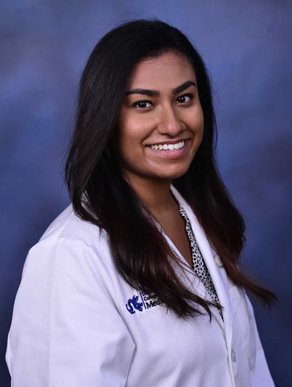A few days after I arrived home from my first year at Drexel, I overheard my father discussing caretaker services for his parents in a conference call with his siblings. My grandparents reside in Hyderabad, India, and have been confined to their home for months through many phases of pandemic lockdowns. With several pre-existing conditions and in isolation, they have yet to receive the COVID-19 vaccine.

In the months leading up to this phone call, I read headlines about the COVID crisis in India: the rapid increase in cases, conversion of hotels and stadiums into makeshift hospitals, dwindling numbers of beds, lack of vaccinations, hesitancy to get vaccinated when supplied … the list goes on. Then, more headlines came: India running out of oxygen, people traveling from hospital to hospital across the country, and crematoriums struggling to keep up with mortality.
To witness my U.S. family worry about our India family’s health and safety, while being physically removed from India’s realities, has been a unique facet of my pandemic experience. In our limited capacity as an immigrant family overseas, we have researched resources in India that administer vaccines in facilities for the elderly, connected our family in India with caretakers and physicians, and regularly communicated and updated them and each other on the status of the pandemic, all while strongly urging them to stay put. And we are so deeply aware of the privilege we have to be able to keep in frequent contact, learn from those in the field, and trust that our elderly family members can stay safe in their homes. Unfortunately, this is not the case for so many across India.
Having completed a year of medical school and a master’s in global medicine, I am more confident in the way that I convey relevant information about health and medicine during the pandemic. I am inspired by so many physicians in the field and my Drexel classmates who have answered the call to action across many social justice movements. And so, when it came for fundraising for oxygen supplies, spreading pamphlets and infographics on updated medical information, and joining a coalition through the South Asian Medical Student Association (SAMSA), I felt equipped and emboldened to serve causes that provide aid for India.
However, when it came to conversations with family and friends about the COVID crisis, I found that my knowledge of what to say about the pandemic fell short. Because when those I speak to face very imminent health scares, what I say becomes less about understanding the pandemic, and more about acknowledging the emotional toll and supporting them. I also find myself wading through layers of cultural differences, religious beliefs, vaccine skepticism, and uncertainties about resistant strains. Somehow, I must exercise empathy and patience while also steering family members away from misinformation, without overstepping or offending cultural familial dynamics. And what about my friends who are working on the front lines fresh out of medical school, or those who have lost so many loved ones? Grief, frustration and burnout – these have been the themes of many conversations with loved ones in India. And while these elements themselves are not unique in a year of critical social justice movements and a pandemic, the added components of culture and family have required that I adapt my navigation through these conversations. At the very least, these conversations of support, education and advocacy are critical to better understand how I may play a part, even when I am across the globe. If there is anything I have taken away from the last year, it is the importance of listening in advocacy, starting the conversation, and stepping up in the best way we know how.
I recognize that my personal experience with India’s COVID crisis is exactly that: personal. There are many degrees of the personal impact this pandemic has had on families and communities around the world, and I do not mean to impose my own understanding of India’s COVID conditions on those in India or elsewhere. From the outreach and collaboration that I have seen in aiding India, I believe that such efforts stem from empathy, compassion and advocacy that are collectively experienced in this time.